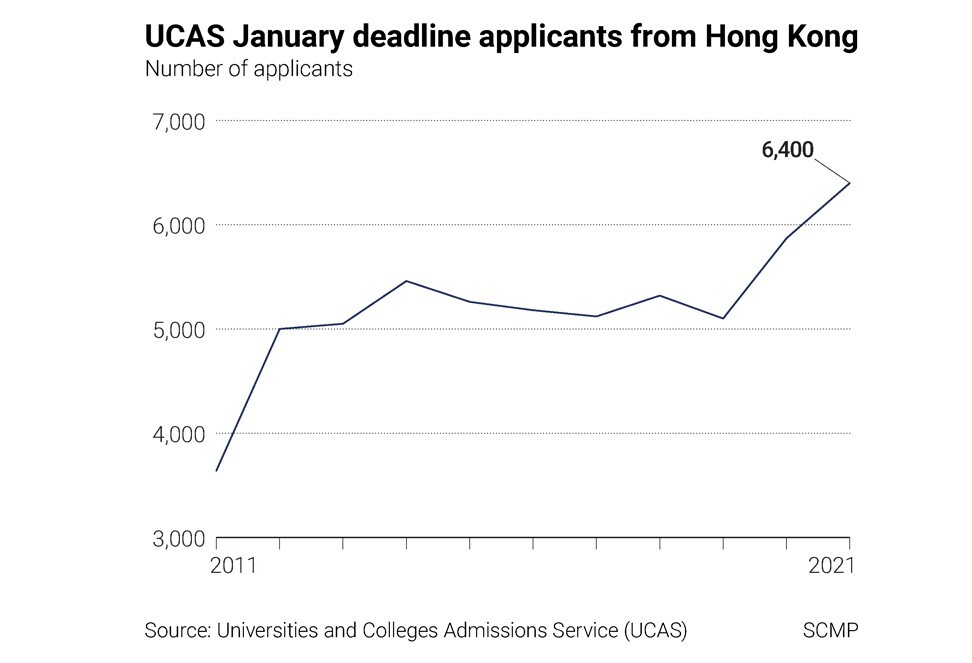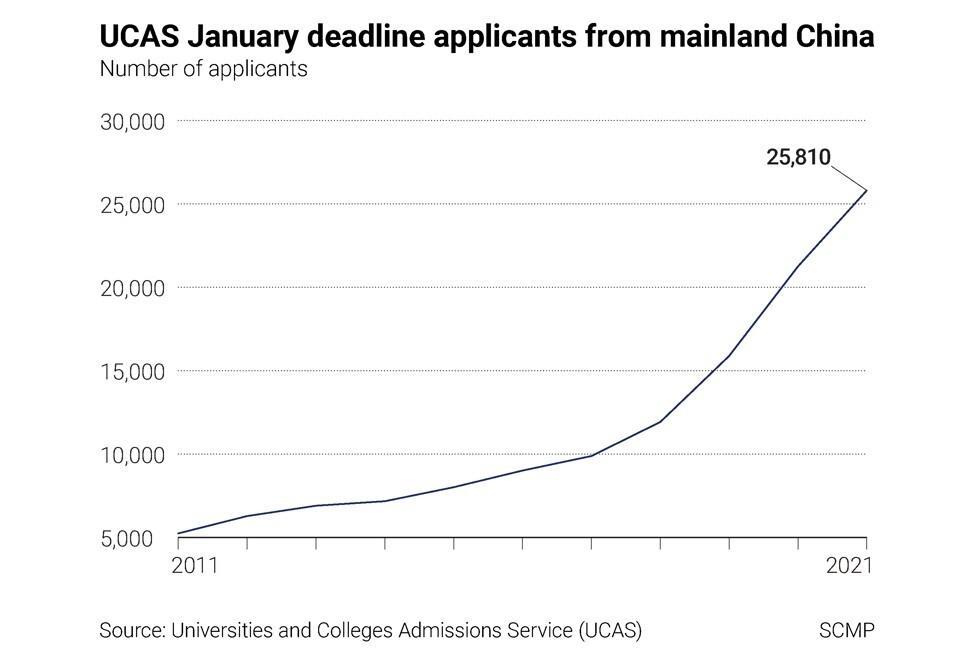
Surge in Hong Kong and mainland Chinese students applying to British universities driven by BN(O) passport scheme and US-China relations, analysts say
- Latest figures show number of applicants from Hong Kong rose almost 10 per cent to about 6,400
- Increase in students from mainland more than 20 per cent at 25,810
The number of students from Hong Kong and mainland China applying for British universities rose to its highest in more than a decade, after rising by about 10 and 20 per cent year on year respectively, according to official statistics.
Latest figures from the Universities and Colleges Admissions Service (UCAS) showed that of the 85,610 applications received from outside Europe, about 6,400 were from Hong Kong, up more than 9 per cent compared to 5,870 last year.
The statistics, released on Thursday and taken from the January deadline which the vast majority of applications are submitted, also showed the number of applicants from across the border rose to 25,810 this year, a 21 per cent increase from 21,250 last year.

A total of 616,360 people in Britain and across the world applied for British universities, UCAS said, an increase of more than 8 per cent compared to last year.
“Although we are expecting to see a rise of overseas applications by Hong Kong students this year, the increase rate [for other countries] might not be as high as that of British universities,” said Ng Po-shing, a consultant from Hong Kong-based student guidance organisation Hok Yau Club.
“The environment in Britain may be more familiar to many, while some students’ friends and relatives may already be living there or have studied there before.”
China plans to put children off studying abroad
About 40,012 students have applied for undergraduate places at Hong Kong universities in 2021, according to the local Joint University Programmes Admissions System (JUPAS), a 3 per cent drop from last year and a decade low.
The new BN(O) scheme, which was unveiled by Britain last July in the wake of the imposition of the security law and began taking applications on January 31, opens a potential pathway to citizenship to up to an estimated 5.4 million people out of the city’s 7.5 million population.
“Some students may have more long-term plans,” Ng said. “If they prefer the atmosphere of an overseas country more, they may take studying as the first step, and eventually they may consider working there or even emigration.”

Henry Wong Yuk-chun, general manager at The Edge Learning Centre, which provides consultancy services for universities in Britain, Canada and the United States, also believed the new BN(O) visa system had acted as a major factor luring more local students to apply for British universities.
“Amid a surge of applications for the new BN(O) visa, there are also parents who decided to move to Britain as a family, including their children,” Wong said, adding inquiries about overseas universities from Hong Kong students rose by about 15 per cent over the past year.
In terms of the rise of mainland applicants, Wong, who oversees the company’s branches in Beijing and Hong Kong, believed tense US-China relations and the pandemic could also have been a contributing factor.
Figures from China’s Ministry of Education showed more than 700,000 Chinese residents studied abroad in 2019, an increase of about 6 per cent compared to the previous year.
“One major reason is because many Chinese students turned away from US universities to British universities because of the US-China relations and [unfriendly policies towards Chinese students], as well as the US’ handling of the pandemic,” he said.

06:15
BN(O) passport holders flee Hong Kong for new life in the UK, fearing Beijing’s tightening control
An UCAS spokeswoman did not comment in a response to the Post on whether the city’s political situation, or the new BN(O) scheme, had fuelled applications this year, only saying they believed “Hong Kong has always shown strong support”.
She added: “The increase in applications from both Hong Kong and mainland China show the value that international applicants and their families place on studying at the UK’s world-class institutions, regardless of the pandemic.”
For international students, applicants from outside the European Union continued to rise, and were up this year by 17 per cent to 85,610, with applicants from the US rising by 61 per cent to 6,670, while those from India increased by about 25 per cent to 7,820.
But European Union applicant numbers have decreased by about 40 per cent to 26,010 this year, with UCAS citing “short-term effects and uncertainty at the end of the last calendar year surrounding [Britain’s] withdrawal from the EU”.

